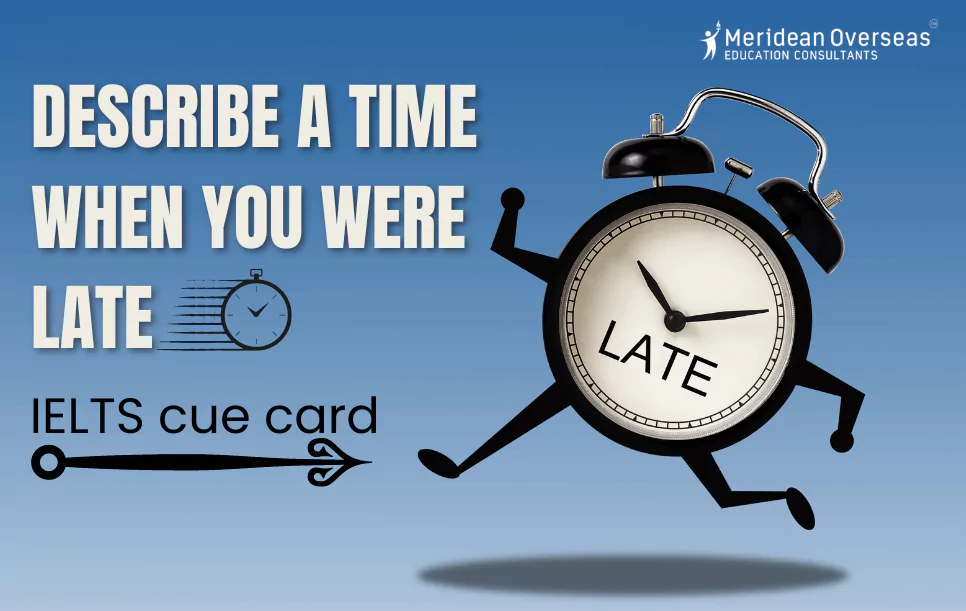
Updated On 30 April 2024 & Read Time 8 minutes
1.3k
Speaking goes beyond simply displaying one's language; it takes concentration and creativity. The cue card component of the IELTS speaking test, which is the second stage of the exam, allows you to express yourself and show off your language proficiency freely.
Have you had enough experience responding to the IELTS speaking section? Are you confident that you have prepared enough for your exam? If not, then don't worry- it's never too late. Start with reading this article which explains how to answer questions like ‘Describe a time when you were late’ on an IELTS cue card in an orderly way.
Punctuality is a concept that we learn in the early stages of life. It is the ability to do something or arrive somewhere on time. Although I am usually punctual, I will discuss an instance where I was late and almost missed my train.

In 2019, during my semester break, I interned with a law firm in Delhi. It was during August, and it was my best friend’s birthday. So, I convinced my family members that I would go to her hometown to surprise her. Further, I booked a train ticket and planned everything out.
After booking the tickets, I went to my cousin’s house because his house was near the railway station. After a long while, I had met my cousin so we chatted all night. We slept quite late, so I could not wake up on time.
I panicked and felt anxious about being late because it nearly caused me to miss my train. A late night’s sleep could have also destroyed my surprise.
We rushed to the railway station as soon as we woke up. The train was on the first platform, which made it easier for me to board, and the railway station was close to the house. Thankfully, I had packed everything the previous night, so we could leave as soon as we woke up.
To conclude, no matter how much we want to do something, sometimes we should prioritise things and work accordingly, otherwise, it could cost a lot. In this case, there were chances that I would not have been able to board the train.
Also, read: Describe a Person You Would Like to Study or Work with - IELTS Cue Card
Every individual has been a victim of being late at some point. Hence, it is necessary to understand the importance of being on time and value it. Here, I would like to discuss an instance where I was late.
This happened when I was in my 12th standard and was appearing for my Board exams, everyone who appeared for it understood its importance and would relate to how strict the rules are at the exam centres.
My exam centre was approximately 10-12 kms from my house and I got stuck in traffic during the Economics exam. I rushed to reach the centre on time but it was useless as the gates were almost closed when I reached the centre.
I was terrified that if I could not appear for my exam, I would have to repeat a school year, which would be a waste of one year. Usually, I am punctual and reach these locations on time, but this incident made me panic. In that panic, I was thinking of all the negative things.
Thankfully, my exam centre was my old school where I had spent 10 years and all the senior teachers and management knew me. They knew me and understood that it was a genuine mistake and I am a punctual person,otherwise. When I explained the situation, they understood the situation and allowed me to enter the premises and let me take the exam while making me sit in a separate classroom.
To conclude, this experience made me better understand the importance of time and all the other things. If the school had not been my previous school and the teachers had not known me personally, they would not have accepted my story, and the situation would have been different for me. This minor mishap would have cost me an entire school year.
Also, read: Describe an Actor or Actress Whom You Admire - IELTS Cue Card
Question- What are some reasons people could be late for a scheduled meeting in your country?
Answer- In my homeland, people frequently arrive late for meetings or appointments due to traffic jams. Unexpected occurrences like crises, unplanned job obligations or delays in public transit can also cause someone to be late. Inaccurate estimates of travel times may lead to people arriving late. Lastly, in some contexts, cultural factors like a lax attitude towards punctuality may contribute to lateness.
Question- In your opinion, what types of excuses do people use when they are late?
Answer- People in my country have different reasons for being late, such as heavy traffic, unanticipated events, car accidents, oversleeping, getting lost or confused about directions and delays in public transit. A family emergency, a work-related issue or a car problem are among other reasons. Individuals may also provide health-related justifications, such as being sick or having an appointment with a physician. It is important to note that although some justifications could be true, others are not.
Question- Why do some people find it hard to follow their plans?
Answer- I believe there are several reasons why certain people find it difficult to follow through on their goals. One of the most common causes is a lack of drive or self-control. Even though people may establish plans or set goals, they frequently find it difficult to follow through because they need more motivation or willpower. It can also be challenging for people to concentrate on their goals when they are overburdened or diverted by other obligations or tasks. It might be challenging to follow plans due to unforeseen occurrences or situations that interfere with one's schedule, a lack of time management abilities or high expectations.
Question- Do you think planning is important for time management? [Why? /Why not?]
Answer- I do believe that planning is essential to effective time management. When we organise our time, we prioritise tasks and create goals, which helps us use our time more effectively. We may also foresee and prepare for future obstacles and problems when we plan. Approaching our tasks with a focused and clear viewpoint may reduce stress and increase productivity. Additionally, planning enables us to maximise our time by avoiding wasting time on pointless tasks or activities.
Question- Do old people and young people similarly manage time? [Why?/Why not?]
Answer- I think that younger individuals and seniors might not handle their free time similarly due to differences in priorities, experiences and lives. Older folks may have more ingrained routines and habits and better time management expertise. Conversely, younger individuals could be less experienced in time management and more prone to distractions.
It is important to emphasise that individual characteristics might impact time management more than age. Owing to health problems or life changes, some elderly individuals may find it difficult to manage their time. In contrast, with their high enthusiasm and focus, young people may be very adept at it.
Also, read: Describe a Place You Visited Where the Air Was Polluted - IELTS Cue Card
‘Describe a time when you were late’ is a common topic in life, where every individual has had an experience where he/she was late. Understanding the importance of time management and being on time is essential.
We hope you learned how to answer the “Describe a time when you were late” type of questions in your IELTS speaking test. If you want to get further details or would like to prepare for IELTS, you may contact our expert counsellors at Meridean Overseas Education Consultants (MOEC). You may also take free online counselling through our website. Our expert counsellors will provide you with the best support and guidance you need for admission and visa. In addition, they will help you shortlist the universities according to your profile. For more information or any queries, contact application02@meridean.org or 1800-1230-00011.


Connect with India's finest counsellors and biggest study abroad community.
Talk to a Counsellor